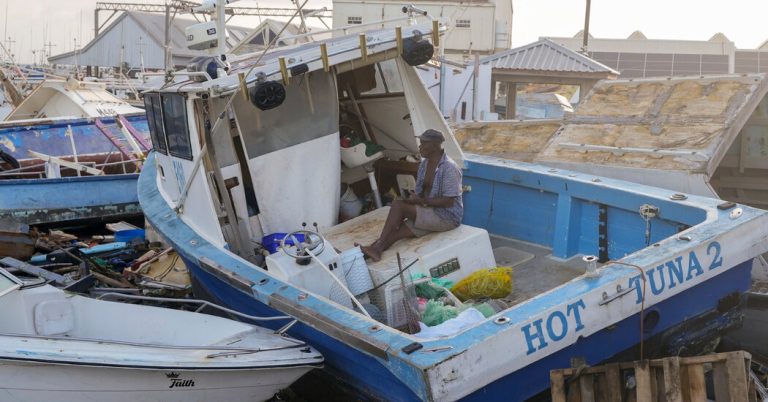Hurricane Beryl was barreling west toward Jamaica as a Category 4 storm on Tuesday, a day after it lashed the southeastern Caribbean and killed at least four people, officials said.
Beryl strengthened to a Category 5 storm late Monday, meaning it had maximum sustained winds of at least 157 miles per hour, according to the United States National Hurricane Center. It was forecast to bring hurricane conditions to Jamaica on Wednesday.
Major Atlantic hurricanes have maximum sustained winds of 111 mph or higher on a five-level scale developed in the 1970s. By Tuesday morning, Beryl had sustained winds near 165 mph, the National Hurricane Center said.
No storm in the Atlantic has ever reached Category 5 strength this early in the season, according to Philip Klotzbach, a Colorado State University meteorologist who specializes in tropical cyclones. By Tuesday afternoon, the storm had been downgraded slightly to a Category 4.
On Tuesday, the streets of Kingston, Jamaica’s capital, were filled with people rushing to gather last-minute supplies. Busy supermarkets were packed with patrons and many people waited in long queues at ATMs
“It’s better to have it and not want it, than to want it and not have it,” said Saeed Pottinger, 37, who was taking extra medicine, food and other supplies for his mother.
Bumper-to-bumper traffic on the main routes of the city started as early as 9 am.
The situation was expected to worsen as most businesses announced they would close at noon. Prime Minister Andrew Holness of Jamaica also ordered the closure of all government offices except essential services.
Jamaica’s two main airports – Norman Manley International in Kingston and Sangster International in Montego Bay – were to close on Tuesday night, airport operators announced.
The storm surge accompanying Beryl is expected to raise water levels up to eight feet along the Jamaican coast on Wednesday. Flash flooding is also a concern as the storm brings up to 12 inches of rain.
The country’s main electricity provider, the Jamaica Public Service, has advised Jamaicans to be prepared for power outages. Mr Holness urged people in low-lying areas, particularly along the south coast, where Beryl is expected to pass, to evacuate.
“I understand very well that people do not want to give up their property. but the most important thing is your life,” he said at a press conference this week.
On Monday, Beryl roared across several Caribbean islands and four deaths were later reported in Grenada, Carriacou and St Vincent and the Grenadines.
The storm reached Carriacou, a small island north of Grenada, on Monday morning and “flattened” it in just half an hour, Grenada Prime Minister Dickon Mitchell said in an update broadcast on social media. Government officials also expected “extreme” damage on the neighboring island of Petite Martinique.
During a briefing on Tuesday, an official said 95% of roofs and homes in Carriacou and Petite Martinique had been lost.
The full extent of the devastation in Carriacou and Petite Martinique, which has a combined population of about 6,000 people, will not be clear until late Tuesday, officials said. There was no electricity on either island and communication was difficult.
One death was reported in Grenada’s capital St George after a tree fell on a house. “This hits home,” Mr Mitchell said. “The deceased is actually the relative of one of the individuals who spent the last 36 hours with us here at the National Emergency Operations Center.”
Just north of Carriacou, several islands in St. Vincent and the Grenadines also suffered “enormous damage,” Prime Minister Ralph Gonsalves said in an update on social media. One death was reported and hundreds of homes, schools and churches were severely damaged, he said.
An estimated 90 percent of homes on Union Island were severely damaged or destroyed, and similar levels of destruction were expected on Mayreau and Canouan islands, Mr. Gonsalves said.
Beryl, the season’s first Atlantic hurricane, left a trail of destruction in its wake as it made landfall: trees snapped, widespread storm surge and roofs blown off as winds reached more than 150 miles per hour.
The hurricane was an anomaly in an already unusually busy storm season, which stretches into late November. When it developed into a Category 4 storm on Sunday, it was the third major hurricane in the Atlantic Ocean in June — and the first time a Category 4 hurricane has materialized there so early in the season.
The storm was also historic for the short time it took to strengthen from a tropical depression to a major hurricane — 42 hours — a direct result of above-average sea surface temperatures. The rapid escalation was a feat recorded only six other times in Atlantic hurricane history.
Officials in Barbados said Monday that the island had been spared the worst of Beryl.
Barbados Prime Minister Mia Mottley said in a nationwide broadcast from the island’s emergency operations center that 20 fishing boats, including two popular cruisers, may have sunk. However, he added, “This could have been a lot worse for us.”
Reported by Jovan Johnson from Kingston, Jamaica. Julius Gittens of Christ Church, Barbados; Linda Straker from Gouyave, Grenada. Kenton X. Chance of Kingstown, St. Vincent? Sharefil Gaillard from Gros Islet, St. Lucia? Maria Abi-Habib from Mexico City. and Yan Zhuang from Seoul.




